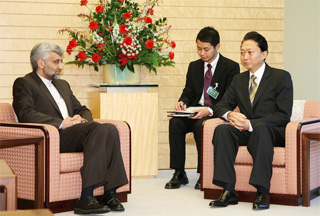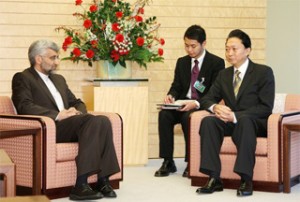Iran welcomes Japan’s outlook on Afghanistan

One of Iran’s top diplomats says Tehran and Tokyo share the same vision on Afghanistan, as they believe a military buildup is not the answer to its problems.
The secretary of Iran’s Supreme National Security Council said Tehran and Tokyo have the same outlook on Afghanistan, as they both believe the problems the war-torn Central Asian state currently faces do not have a military solution.
Saeed Jalili, who is on a tour of Japan, made the comment in a meeting with Japan’s Prime Minister Yukio Hatoyama, as he touched upon the important role that Tehran and Tokyo can play in the development of the region and Asia in general.
“The troop surge in Afghanistan is a repetition of past failed policies,” Jalili said.
Japan is one of the largest donors to Afghanistan with $6.9 billion pledged funds.
The Japanese government’s aid organization, the International Cooperation Agency, has also sent 90 employees to Afghanistan, a number which was reduced to 50 after the UN guest house bombing in Kabul 3 months ago.
Iran is also one of the largest contributors to Afghanistan’s development, despite having suffered a great deal of damage itself because of the proximity to the world’s leading producer of illegal drugs.
In 2009, Iran was the fourth largest investor in Afghanistan, with funds going to agriculture, health care and reconstruction projects, especially those involving infrastructure such as, roads, bridges, and the electricity network.
Since the war began, Japan has aided the US-led coalition forces in Afghanistan with a naval mission that provides fuel to US and British vessels operating in the Indian Ocean.
However, Japan’s new government has vowed to replace its refueling mission in Afghanistan with humanitarian aid, signaling the possible start of a new era in Japanese foreign policy.
While announcing the news earlier in September, Hatoyama said that “Japan wants to make a positive contribution in the field of our specialty… such as agricultural support or job training, which the Afghan people would be pleased to see.”
He explained the Japanese initiative is to provide paid vocational training, mainly to former Taliban members.
The mission aims to pave the way for reducing poverty among the former militants based on the argument that many young men join the Taliban movement for money.
Even though it seems not easy for Japan to step out of the US sphere of influence, the new government in the country has promised to pursue a an independent diplomatic course, one that could take Tokyo away from its top security ally, Washington.
US analysts fear the victory of the Democratic Party against the Liberal Democratic Party may be the start of a deeper change in the Asian country’s orientation and a move away from its long-time dependence on the United States.
Comments made by Japan’s new Prime Minister have added to those worries in the US, as he has vowed to pursue an independent diplomatic course, one that could take Tokyo away from its top security ally, Washington.
“Japan up until now has been receptive to the United States, but I want to build a relationship in which Japan can act more proactively and tell them our opinions frankly,” Japan’s new Prime Minister said in his first press conference in office in September.
An expert on Japanese foreign policy at the American Enterprise Institute in Washington Michael Auslin is one of the analysts that share that view.
“There is a fear of dramatic change in the US-Japan alliance… No one knows what will happen next, or even who to talk to for answers,” Auslin told The Washington Post earlier this year.








